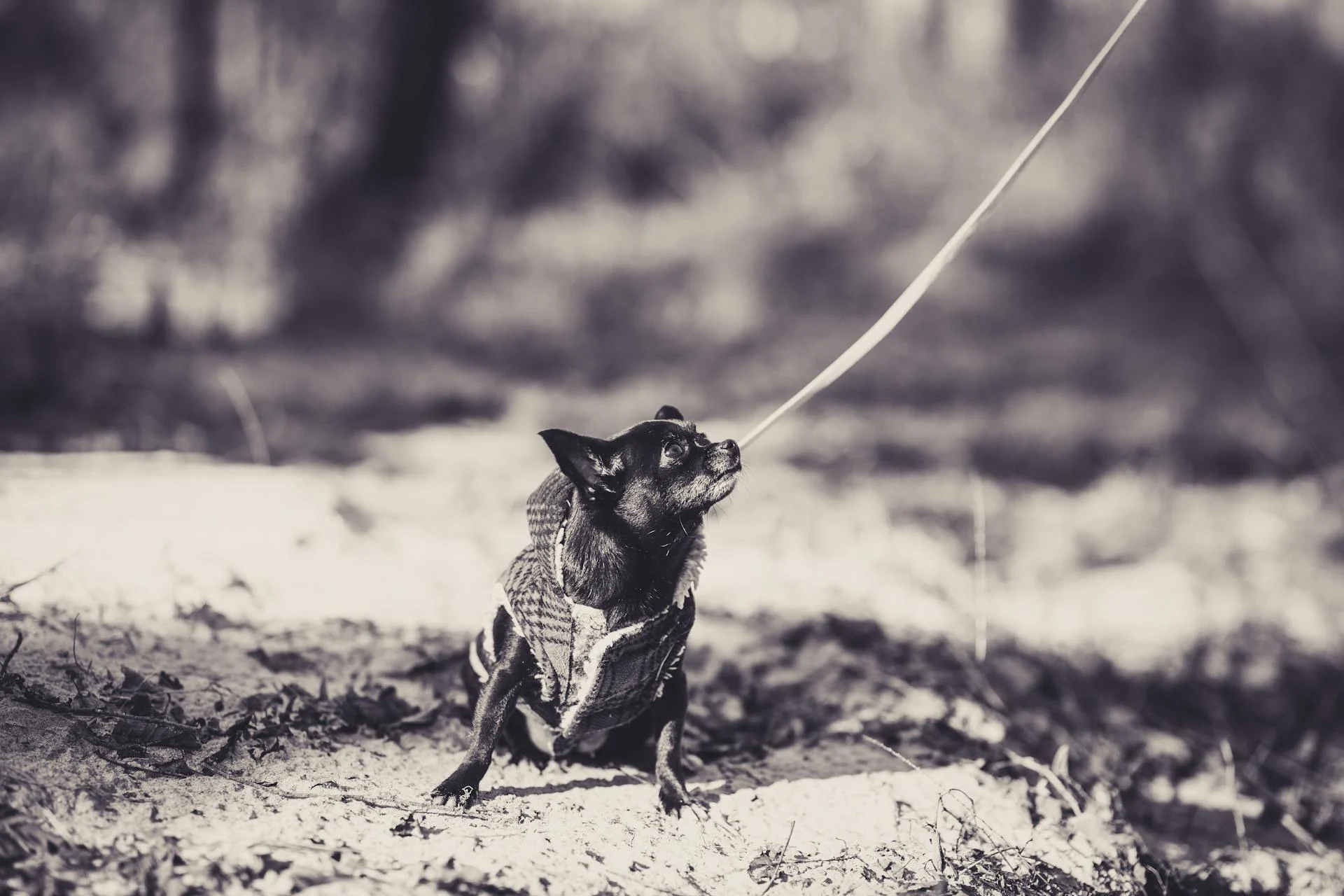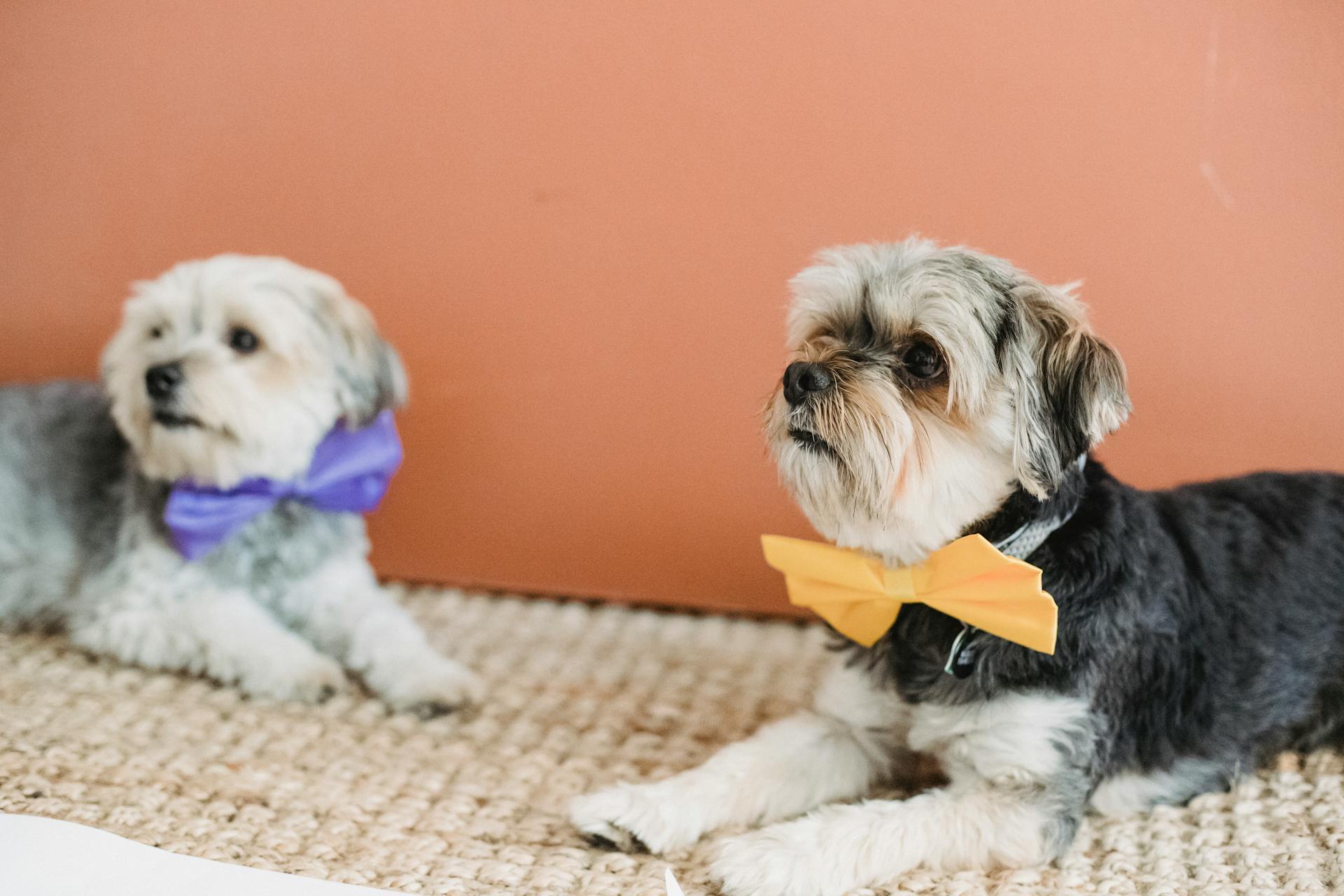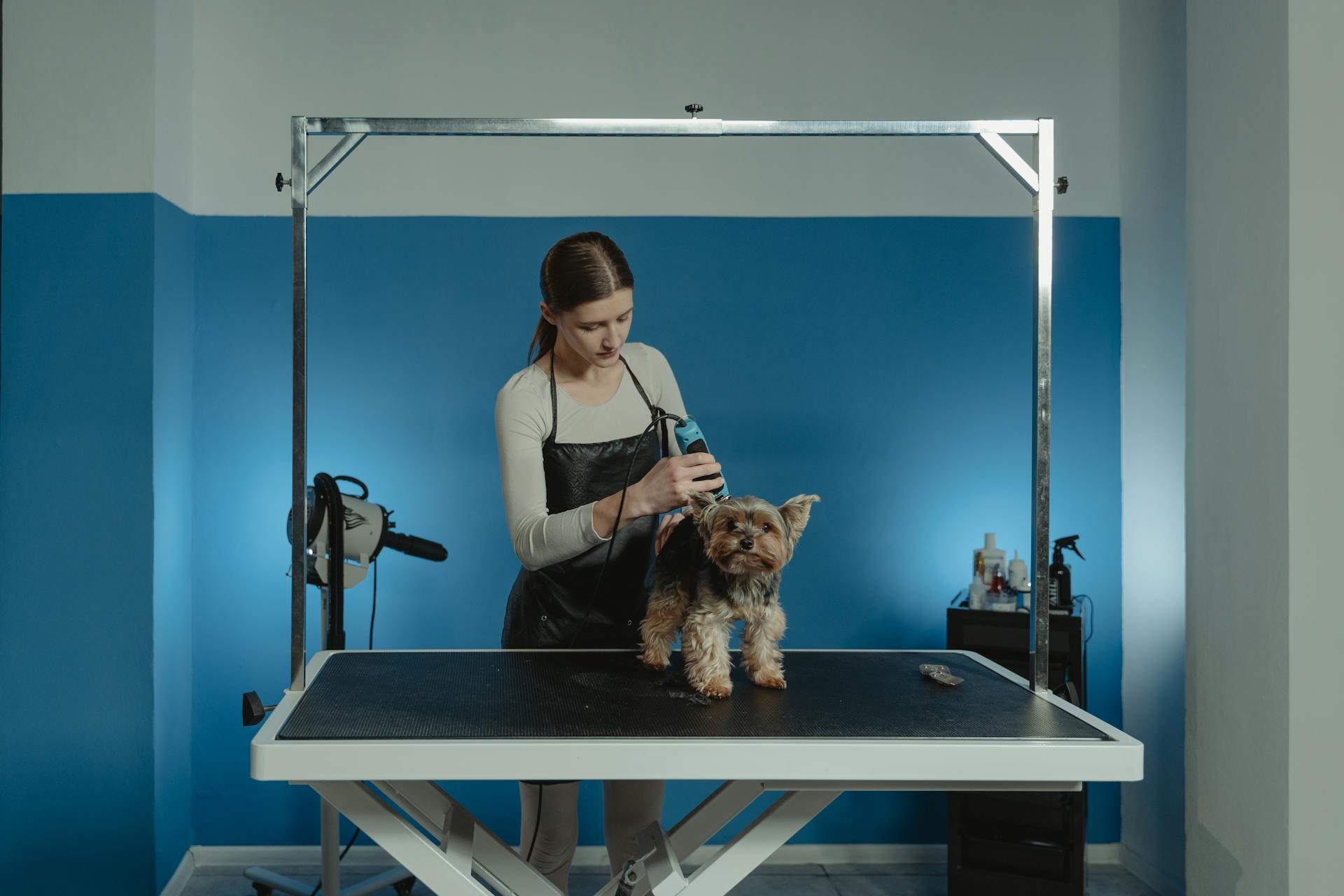
The Biewer Terrier is a breed that's often misunderstood, but with the right information, you can make an informed decision about whether it's the right fit for you. They're a small, affectionate dog that's known for their gentle nature.
One of the main pros of the Biewer Terrier is their low-shedding coat, which makes them a great choice for people with allergies or who prefer less dog hair. This is due to their unique genetic makeup, which sets them apart from other terrier breeds.
Biewer Terriers are also highly intelligent and trainable, but they can be stubborn at times. Consistent training and positive reinforcement are key to developing good behavior in this breed.
Suggestion: Boxer Dog Breed Pros and Cons
General Information
The Biewer Terrier is a small dog breed that originated in Germany. They typically weigh between 4-8 pounds and stand between 7-11 inches tall.
These dogs have a hypoallergenic coat that requires regular grooming to prevent matting. They shed very little, but their long, silky hair needs to be trimmed regularly to prevent it from reaching the ground.
The Biewer Terrier is a loyal companion that forms strong bonds with its owners. They are active, playful, and intelligent dogs that thrive on attention and interaction. With proper care and attention, a Biewer Terrier can live for 12-16 years.
Here are some key characteristics of the Biewer Terrier breed:
History
The Biewer Terrier's history dates back to 1984 when Werner and Gertrude Biewer, experienced Yorkshire terrier breeders from Germany, had two puppies with an unusual color.
These puppies, Schneeflocken von Friedheck and Schneeman, were the starting point for the development of the Biewer Terrier breed. They had white coats with black and blue patches instead of the tan and blue markings of the typical Yorkshire terrier.
The Biewer family selectively bred these unusual puppies over the years to develop a consistent population of Biewer Terriers. This selective breeding led to the breed being recognized by the AKC in 2021.
The Biewer Terrier was initially named after its creators, the Biewer family, and was introduced to the public in 1986. The name was later changed to Biewer Terrier after the breed was perfected.
Check this out: Pros and Cons of Australian Cattle Dogs

In the early 2000s, Biewer Terriers were imported to the United States, and the Biewer Terrier Club of America (BTCA) was formed. The BTCA worked to establish the breed as a purebred dog breed, separate from the Yorkshire terrier.
The Biewer Terrier's popularity is growing, but there are still only a few thousand registered Biewer Terriers in the United States. This limited registration makes it difficult to find a reputable breeder and can be expensive.
You might enjoy: Border Terrier Personality
Information
The Biewer Terrier is a breed that's perfect for small living spaces, weighing in at just 4-8 pounds. They're tiny dogs with a big personality, and they love their owners deeply.
Their lifespan is between 12-16 years, making them a long-term companion. With proper care, they can live a happy and healthy life.
These dogs have a unique appearance, with a coat that's generally white with black and tan markings. They don't come in other colors, and their coat requires regular grooming to prevent matting.
Their intelligence and trainability make them a great choice for first-time dog owners. However, they do require attention and socialization to prevent behavioral issues.
Here's a quick rundown of their physical characteristics:
Their temperaments are affectionate, devoted, playful, and social, making them a great fit for families with children. However, they do require regular attention and interaction to prevent boredom and destructive behavior.
Questions and Answers
A Biewer Terrier can live for 12-16 years, which is a significant commitment to caring for one of these adorable dogs.
The average litter size for a Biewer Terrier is between 2 to 4 puppies, so be prepared for a joyful but potentially chaotic household.
If you're considering buying a Biewer Terrier from a breeder, be prepared to spend between $1500 and $3000. However, this can be a good investment if you want to ensure you're getting a healthy puppy from a reputable breeder.
A reputable breeder will typically allow you to meet the parents of the puppy, which can give you a good idea of the puppy's potential temperament and appearance.

You'll also get paperwork that documents the puppy's lineage, which can be useful for future veterinary care or showing.
If you're allergic to dogs, don't worry – Biewer Terriers are not considered hypoallergenic. However, it's still a good idea to spend some time with a Biewer Terrier before bringing one home to see how you react.
The American Kennel Club (AKC) has ranked Biewer Terriers as one of the top 3 most popular purebred dogs in the US.
You might like: Pros and Cons of Border Terriers
What Do They Look Like?
The Biewer Terrier is a toy-type terrier with a unique appearance. They have a tricolor coat with a white base and black or blue and tan markings. Their hair is straight, silky, and hypoallergenic, making them a great choice for those with allergies.
Their coat is a defining feature, with white and tan markings on a white base, and blue or black markings. This color pattern sets them apart from other terrier breeds, like the Yorkshire Terrier.
For your interest: Black Mouth Cur Pros and Cons
The Biewer Terrier's hair is long and silky, falling symmetrically down both sides of the dog. Their plumed tail is carried high over the back, adding to their elegant appearance.
Here are the key physical characteristics of the Biewer Terrier:
Personality
Biewer terriers are affectionate and loyal companions, often forming strong bonds with their owners.
They are highly intelligent and love to be taken anywhere their owners go, making them great travel buddies.
These dogs require constant human attention and can develop separation anxiety if left alone for too long.
Biewer terriers thrive in active families and need daily exercise and interactive play sessions to stay happy and healthy.
They are social dogs that welcome other animals, but socialization is essential to prevent small dog syndrome.
Biewer terriers are known for their sweet and gentle nature, making them adaptable to different living conditions.
They are not prone to territorial barking or stubbornness, which makes them a great choice for families with older kids who know how to handle a fragile pet.
Biewer terriers love to cuddle and will take anything as an invitation for snuggles, so be prepared for plenty of kisses and nuzzles.
They are generally good with other pets if well socialized, but it's essential to supervise interactions between dogs.
Readers also liked: Great Pyrenees Pros and Cons
Interactions and Behavior
Biewer terriers are generally good with other animals, especially dogs of all sizes, due to their friendly nature and ease of socialization.
They can also do well around cats with some socialization, but it's best to keep small animals like birds, hamsters, and Guinea pigs separate from them.
Biewer terriers tend to be nervous and wary of other dogs, especially larger ones, but once they get past the first introduction, they usually get along quite well.
They are prone to chasing small animals, so it's essential to keep them separate from prey animals.
A well-socialized Biewer terrier won't display signs of aggression unless threatened or irritated, and they tend to stick to their owner's side if new people are at home.
However, if a stranger enters their space without giving them enough time, they may get irritated, which can lead to aggressive behavior.
Biewer terriers make a fantastic family pet, especially for families with older children, as they are extremely playful and loving.
However, it's essential to supervise younger children when they're around the dog, as their small size makes them more susceptible to injuries.
Are with Children?
Biewer terriers are a fantastic family pet, extremely playful and high in energy. They will be a valuable and loving friend to your children.
Their small size makes them more susceptible to injuries, so it's essential to supervise younger children when they're around. Older children are generally more aware, but a conversation with your kids to make them understand the possibility of an accident when playing with the dog is always a good idea.
To ensure everyone gets along well, socialize your Biewer terrier around children early and teach kids how to interact with the dog. If children don't respect a Biewer terrier's boundaries, they may quickly get irritated, which can make them snap or growl at children.
Biewer terriers can get along well with kids of all ages, but children must be taught to respect their space. They don't like rough handling, and their small size makes them prone to accidental injuries during play sessions.
Supervising play sessions is crucial, as it helps prevent accidents and ensures a harmonious household. By teaching kids how to interact with the dog, you can create a loving and safe environment for both the children and the Biewer terrier.
Dogs with Other Animals
Biewer Terriers get along well with other dogs, especially at a young age, seeing them as potential friends and playmates rather than a challenge.
They can also do well around cats with some socialization, but it's essential to remember their terrier instincts.
Biewer Terriers are prone to chasing small animals, so it's best to keep birds, hamsters, Guinea pigs, or other small animals in a separate part of the house.
Are Aggressive?
Biewer terriers are generally not aggressive by nature, but they can display signs of aggression if threatened or irritated. They tend to be lovey-dovey dogs that are more relaxed and welcoming than other terriers.
A well-socialized Biewer terrier is unlikely to bark or growl at strangers, but they may get irritated if a stranger enters their space for pets without giving them enough time.
Biewer terriers may feel nervous around strangers and may not be too comfortable in their presence, so it's essential to reassure them and socialize them well with other humans as a puppy.
It's rare for a Biewer terrier to display aggressive behavior, but it's possible if they're not given enough space or time to adjust to new people or situations.
Dogs with Other Dogs
Biewer terriers tend to be nervous and wary of other dogs, especially larger ones.
Their first introduction can be a bit rocky, with some barking, but a little reassurance usually helps them settle down.
They may get along quite well with other dogs once they get past that initial introduction.
A well-socialized Biewer terrier will generally not display signs of aggression unless threatened or irritated.
In fact, they're often described as lovey-dovey dogs, which is a testament to their friendly nature.
It's worth noting that Biewer terriers can get along with dogs of all sizes, especially if socialized at a young age.
However, they do have a strong prey drive, which means they might not be the best match for households with small animals.
Health and Care
Biewer terriers are generally healthy, but like all breeds, they can be prone to certain health issues. Regular vet visits are crucial for early detection or prevention of health problems.
To live a healthy and happy life, Biewer terriers need regular grooming, socialization, obedience training, daily exercise, and affection from their humans. They're fragile dogs, so rough play and jumping from furniture should be discouraged.
Some potential health concerns associated with Biewer terriers include patellar luxation, tracheal collapse, Legg-Calve-Perthes, eye issues, dental problems, and digestive disorders. Here are some specific health issues to be aware of:
- Patellar luxation
- Tracheal collapse
- Legg-Calve-Perthes
- Eye issues
- Dental problems
- Digestive disorders
Biewer terriers usually live 12-15 years, but it's essential to choose a reputable breeder and stick to routine vet visits to ensure their health and well-being.
Health Concerns
Biewer Terriers are generally a healthy breed, but like all breeds, they can be prone to certain health issues. Some of these issues include patellar luxation, tracheal collapse, and Legg-Calve-Perthes disease.
Regular veterinary check-ups are crucial in early detection and prevention of these health problems. It's also essential to choose a reputable breeder who can provide proof of health for the parents of the litter.

Some common health concerns in Biewer Terriers include sensitive stomachs, hypoglycemia, and patellar luxation. These issues can be painful and potentially life-threatening if left untreated.
Here are some specific health concerns to be aware of:
- Luxating Patellas: Where the knee caps temporarily fall out of place.
- Keratoconjunctivitis Sicca: Also known as Dry Eye, this is when tear production is reduced, the dryness could eventually damage the cornea.
- Lens Luxation: Dislocation of the lens in the eye.
- Atopy: This is when the dog's skin is sensitive and more susceptible to allergies.
- Bladder Stones: Minerals collect and form in the bladder, it can be painful and will require veterinary treatment.
- Tracheal Collapse: Weakness in the windpipe which could lead it to collapse.
These health concerns can be managed with proper care and attention. By working closely with a veterinarian and taking preventative measures, you can help ensure your Biewer Terrier lives a happy and healthy life.
How Long Do They Live?
Biewer terriers are known to live a long and healthy life, with an average lifespan of 14 to 16 years.
Genetics play a significant role in determining a Biewer terrier's lifespan, so it's essential to choose a reputable breeder who prioritizes health testing.
With proper care and attention, many Biewer terriers live well into their teens, enjoying a happy and active life with their owners.
A balanced diet, regular exercise, and a stress-free environment all contribute to a Biewer terrier's overall quality of life and lifespan.
Dog Care
To keep your furry friend healthy and happy, regular vet visits are a must. Biewer terriers need to see their vet at least once a year, but it's best to check in more often if your vet recommends it.
Daily exercise is essential for Biewer terriers, so be prepared to take them out for a walk or playtime every day. Aim for at least 30 minutes of exercise per day.
Biewer terriers need regular grooming to prevent matting and tangling of their fur. Brush their coat at least twice a week to keep it looking its best.
Socialization is crucial for Biewer terriers, so make sure to introduce them to new people, places, and experiences from an early age. This will help them become confident and calm in new situations.
Obedience training is a must for any dog breed, and Biewer terriers are no exception. Start training early and be consistent to help your Biewer terrier become a well-behaved companion.
A fresh viewpoint: Crate Training Pros and Cons
Frequently Asked Questions
Can a Biewer Terrier be left alone?
Biewer Terriers may not be suitable for extended periods of alone time due to potential separation anxiety. Crate training can help alleviate this issue, but it's essential to consider their needs before leaving them unattended.
What is the average cost of a Biewer Terrier?
The average cost of a Biewer Terrier is between $2,000 and $3,000. This initial investment may be worth it for the companionship and joy these adorable dogs bring to families.
Featured Images: pexels.com

